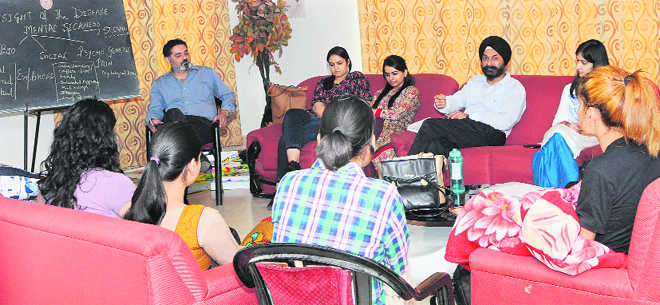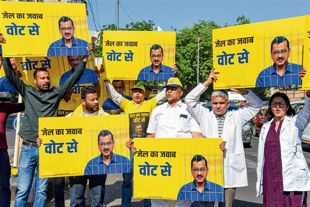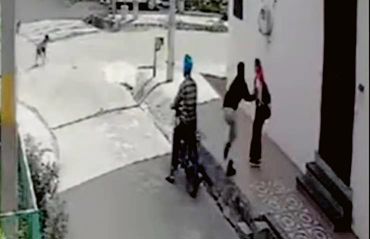
Old threat, new tactics: Women addicts being counselled by Dr Jagdeep Pal Singh Bhatia and his team at The Hermitage in Amritsar. Tribune Photo: Vishal Kumar
Jasmine Singh in Kapurthala/Amritsar
Just how many people are addicted to drugs in Punjab? The state government data appears to suggest the situation is not as bad. (Out of the 2.77 crore population of the state, only 0.06% were found abusing drugs, which is the lowest percentage across the nation, former deputy CM Sukhbir Singh Badal claimed in February 2016, citing a 2015 study). But facts are such that you may be astounded if you look at it from a different perspective:
- The 2015 AIIMS study translates to 837 opioid-dependents per 100,000 people in Punjab, or 0.84% of the state’s population. This alone is more than three times as much as the corresponding all-India figure for all types of drug dependents, based on a Ministry of Social Justice & Empowerment estimate of three million drug dependents nationwide, which is 250 per 100,000, or 0.25% of the Indian population.
- Punjab was home to 56% of Indian opium users, said a 2004 United Nations Office on Drugs and Crime (UNODC) report.
In the maze of data is hidden a dangerous trend: addiction among young mothers and married women. The situation could be gauged from another fact: In Amritsar, a first-of-its-kind women de-addiction centre has come up. This is how some of the victims look like: Sunken eyes, blank expression — Ms A (name withheld on request), mother of a two-month-old baby, sits in the patient chair at Civil Hospital Kapurthala, trying to avoid eye contact. Her fingers are fidgety as she clenches them in a knot. She is there for her daily dose of de-addiction medicine.
Wiping tears off her face, she tells her story. “I started taking heroin to give my husband company. Now that he is dead and I have a small baby to look after, I want to leave drugs,” she says. “I can’t afford the drug — I have no money,” she stares at her knotted fingers.
Dr Sandeep Bhola, consultant psychiatrist and International certified addiction professional (ICAO-II), Kapurthala, treats at least 10 women addicts daily. Most are addicted to heroin. “Since we do not have lodging facility, these women are given the de-addiction dose at a separate centre,” says Dr Bhola.
He says the findings of the Punjab Opiod Dependence Survey (PODS), conducted between February to April 2015 by an NGO and AIIMS were startling: of the opiod dependents in Punjab, nearly 1% are women. “But what about women who do not come forward for treatment because of social stigma?” asks Dr Bhola.
“Unlike men, only 5% of such women ask or for help, fearing social pressure. Shame and guilt are the two reasons that prevent women from seeking help,” says Dr Jagdeep Pal Singh Bhatia, who is credited with opening the first women de-addiction centre, The Hermitage, in Amritsar. He cites poor health conditions in families, lack of communication, abusive behaviour, trauma, depression, over-curiosity as some of the reasons behind drug addiction among women.
Family rehab home
At The Hermitage, Dr Bhatia treats nearly a dozen girls and women in the age group of 18-55 years from across Punjab, Jammu, and even abroad. He says The Hermitage is basically a family rehab home that offers family-structured programme. “Without family support, addicts cannot kick the habit. So, we request parents or at least one parent or husband to be a part of our de-addiction programme. We counsel the addicts and encourage them to get back to their normal lives with complete faith in themselves.
Women drug addicts at The Hermitage are brought either by their family members or a victim has to convince one’s parents to take them to a de-addiction centre because they cannot accept the fact that their girl, or wife is into drugs. Sabia (name changed), an addict from abroad, was brought by her grandparents when she was visiting them in Amritsar. Young, beautiful and hopeful, Sabia took to drugs because of her loneliness. “I was a shy child. I wouldn’t share my problems with my parents. I dropped out of school thrice. And then I was detected with ‘a’ problem, and finally I took to this...But now I am so much better,” she says a faint smile.
There are others who got into drugs to give company to their boyfriends, who later cheated on them for the same reason, shattering their self-esteem. A girl from Punjab started taking drugs because she felt her parents did not understand her at all. “They didn’t let me pursue the career of my choice; they opposed everything I did,” she says.
Where’s the dope?
“The drugs are easily available,” says a victim. “Sometimes we have it home-delivered: one missed call to a dealer means one puddia (a dose), and two missed calls are equal to two puddias.” Of the women who approach Dr Bhatia, around 60% are on opium, 17% on alcohol, and the rest on tobacco. “We get women patients with party drug and heroin addiction as well,” he says.
Smrita, a sociologist from Jalandhar, describes how a girl from a prestigious university in Punjab was forced to dance at weddings, and then took to striptease to procure money for drugs. “This is how many women get into flesh trade. I have also heard from women addicts how they were physically manhandled by their bosses and colleagues when they came to know about their addiction problem.”
Sikand Shetty, a counselor from Mumbai, offers tips to at least five girls daily. “For married women seeking counseling from drug de addiction is a taboo. So, they come to me on the pretext of being treated for depression. I get calls from Delhi, Chennai and Chandigarh. The first thing they request is secrecy. Society does not expect married girls to take to drugs. I treated a married woman from a rich Punjabi family in Ludhiana a year back, her husband requested me to erase all her record for Rs 10 lakh.”
The answer seems to lie in the safe and nurturing environment of the centre and then at home. “Aftercare is vital. The main concern of all doctors is to integrate the women addicts back in society,” says Dr Romesh Mahajan, project director, Red Cross drug De addiction centre. He has successfully treated 67 women, mostly married. “All of them are now well-settled and happy. Their families hated them for taking drugs. Today the same families love them and say it in as many ways as they can.”
Dr Shivinder Singh Gill, former vice-chancellor, Baba Farid University, is in favour of government-run de-addiction centres. “I think private de-addiction centres are unfit to handle women addicts because of many reasons. One, women addicts like others also suffer from either heart or liver problems at the same time. So they need good and trained doctors along with a de-addiction routine. Women de-addiction has many implications like marriage or property issue. Some women are sometimes declared drug addicts so that they can be disowned from the property,” he said.
The findings of the Punjab Opiod Dependence Survey (PODS), conducted between February to April 2015 by an NGO and AIIMS are startling: of the opiod dependents in Punjab, nearly 1% are women. But what about women who do not come forward for treatment because of social stigma? —Dr Sandeep Bhola, Consultant Psychiatrist & International certified addiction professional, Kapurthala



























